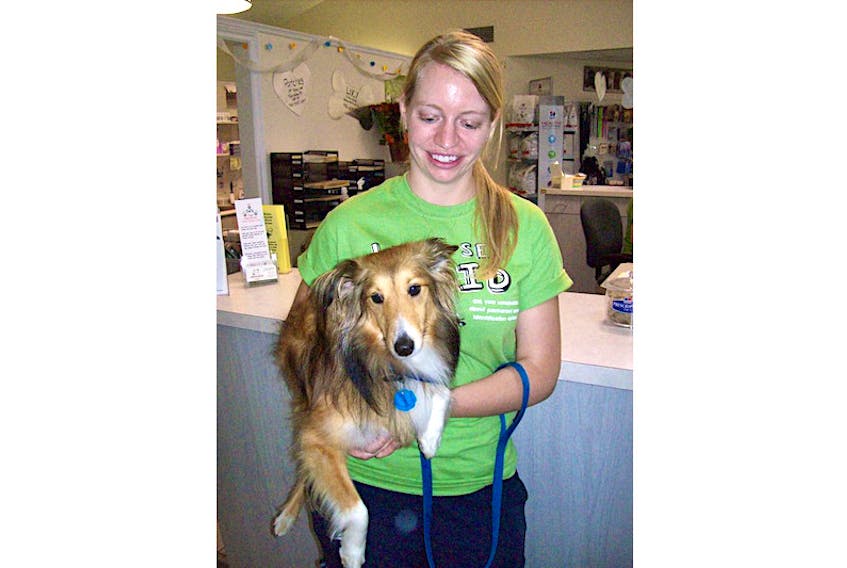FREETOWN, P.E.I. — Thanks to a change in travel restrictions, a Freetown woman was finally able to take her dog to New Brunswick for a treatment he couldn't get on Prince Edward Island.
“I’m pretty excited and relieved to be able to have that opportunity when you were told that you wouldn’t,” said Crystal Isherwood.
On Jan. 10, Isherwood, who works at Summerside Animal Hospital, noticed something was off with Aussie, a 12-year-old Shetland sheepdog.
A veterinarian at the Summerside Animal Hospital confirmed Aussie couldn’t see out of his right eye. The vet suspected he had a torn retina but was unable to say for certain.
Aussie needed to see a specialist; the nearest veterinary ophthalmologist, CullenWebb Animal Eye Specialists, was on the other side of the Northumberland Strait in Riverview, N.B.
The Atlantic Veterinary College’s page on the UPEI website, says it offers 16 different services for pets. Ophthalmology, which deals with eye disorders and diseases, isn’t one of them.
The college, said Isherwood, was bringing in a veterinary ophthalmologist from Ontario in late January.
Isherwood put herself on the waiting list, but even if Aussie was seen and a torn retina was confirmed, Isherwood worried they wouldn’t have the equipment to fix the issue.
“We’re still trying to get the equipment to do torn retinas in the hospital in Charlottetown,” she said.
Dr. Cheryl Cullen, a veterinary ophthalmologist at CullenWebb, said veterinary ophthalmology is a highly specialized service. Her practice, she said, is the only one in Atlantic Canada.
There isn’t a demand for more than the one in the region, Cullen said, and her location, at least, is central.
Cullen said she was “shocked” when she learned New Brunswick didn’t initially consider travel for veterinary services essential, especially since her practice follows guidelines, avoids close contact and doesn’t allow clients inside.
“Pets are people’s family members, right?” she said. “If they have an eye problem that needs to be dealt with, and we know what the problem is and we can fix it, it’s pretty sad when they’re not allowed to come.”
On the morning of Jan. 12, Isherwood filed an online travel registration form, hoping to get approved so she could get to her appointment that Thursday.
Later that night, she was told her request was denied.
“If Aussie was a human being, yes, he would get through,” Isherwood said. “But because he’s a dog, no.”
Meanwhile, Prince Edward Island, according to the province’s website, had been allowing people onto the Island to access emergency services at AVC since the Atlantic bubble “popped” in December.
Isherwood said she was “frustrated” when New Brunswick initially denied her travel into the province. She does understand, though, why travel is restricted during the pandemic.
“People do come before animals, that’s kind of a given,” Isherwood said. “But Aussie, to me, is more like my child.”
Isherwood wasn’t willing to give up easily.
The following Monday, Isherwood sent an email explaining the trip was essential for Aussie’s wellbeing. A day later, she got a response, letting her know that New Brunswick had begun allowing people to come from out-of-province to access urgent or specialized veterinary services.
“I’m very grateful to go over and glad it was such an easy process to get over there after I got my documents,” she said.
At Isherwood’s appointment on Jan. 20, the ophthalmologist confirmed Aussie likely had a torn retina. Isherwood also learned there was bleeding in his eyes, and that the right eye was likely not savable.
She was given eye drops and medication for Aussie that will lower his blood pressure to reduce bleeding in his eyes. She’ll have to go back once the bleeding is under control, and learn whether his right eye will need surgery, or if it’ll have to be removed.
Isherwood can’t help but wonder if the situation would be different had she been able to attend her initial appointment.
“She could have seen more, and she could have given me more answers, and maybe we could have reduced the possibility of bleeding in the left eye,” said Isherwood. “Things happened quite fast.”
Cullen said she and her colleagues were relieved that New Brunswick started allowing travel for those in Nova Scotia or P.E.I. who require her services.
“We’re very happy that was the decision that was taken,” she said. “I can’t help a vet over the phone with something that needs a surgery that only we can offer.”
Isherwood is also glad that the rule change means that not just herself, but others, are now also able to go to New Brunswick so their pets can get the care they need.
“If a client walks in the door and they need to be seen by specialists, we can basically push them though,” she said. “I know that it’s possible, and we can get them in as quickly as possible to save that vision or the eye.”
Kristin Gardiner is the Journal Pioneer's rural reporter.









